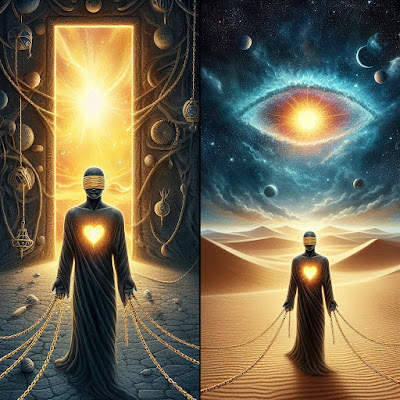The Six-Pointed Star of Balance: Reconnecting Reason, Heart, and Spirit
786
How to Align the Qur’an, Morality, and Nahjul Balagha for Inner Justice and Protection from Negativity
Depression can feel like being trapped in an endless cycle of negative emotions. It is not just an emotional state but often a result of disconnection—from our reason, clarity, and spiritual guidance. When we’re overwhelmed by our emotions, stuck in the heart without engaging our reasoning center, we lose direction. This disconnect makes us feel paralyzed and unable to find a way forward.
From personal experience, I’ve learned that spiritual activities like dhikr and dua, while deeply valuable, don’t always provide relief when reason isn’t activated first. If the mind isn’t engaged, these practices can leave us feeling ungrounded, or worse, deepen the emotional overwhelm. Depression is not simply a lack of faith—it’s a disruption in the system that balances reason, emotion, and action.
The Triangle of Manifestation
In Islam, our tradition offers a profound system of guidance for realigning ourselves. This system can be seen as a triangle of manifestation, which mirrors Freud’s concept of the superego, ego, and id, though it is far more holistic and rooted in divine wisdom. The three elements of this triangle are:
- The Qur’an – Representing divine wisdom and reason, the Qur’an activates clarity of thought and guidance.
- The Holy Prophet (peace be upon him and his progeny) – Representing morality and mercy, provide emotional grounding and heartfelt connection.
- Imam Ali (peace be upon him) – Representing the gateway to ethical knowledge and practical reasoning, his words in the Najj-ul-Balagha provide actionable insights and alignment of our actions with divine purpose.
When these three corners are activated together, they form a powerful system that aligns the heart, mind, and soul. However, if any corner is weak or disconnected, it leaves an opening for Shaytan to exploit, deepening our confusion and despair.
The Sequence Matters
When depression strikes, the sequence of reconnection is critical. Many people start with their emotional center, focusing on dhikr or dua, hoping for relief. While these practices are important, they may not work if reason isn’t engaged first.
I experienced this again today. I began with dhikr and dua during prayer time, but the negative thoughts lingered. It became clear to me that I first needed to reconnect with reason. Turning to the Qur’an, Tafsir, and the words of the Prophet (peace be upon him) and Imam Ali (peace be upon him) restored my clarity. Only then did my dhikr and dua flow with true purpose and connection.
How to Reconnect
Here’s a step-by-step approach to using the triangle of manifestation to overcome depression:
Activate Reason
Start with the Qur’an and Tafsir. Reflect deeply on its meanings, or read a single verse with intention. Engage your intellect by seeking knowledge and understanding divine wisdom.Turn to Ethics
Read the Najj-ul-Balagha or sayings of Imam Ali for practical guidance. His words provide actionable steps to realign your life with divine purpose and activate ethical reasoning.Seek Moral Guidance Through Reading the Holy Prophetic (Saw) Traditions
Finally, connect with the Prophet’s teachings. These traditions not only soften the heart but anchor it to divine mercy, grounding your emotions and bringing peace.
Once the reasoning center is activated, the heart can follow, and spiritual practices like dhikr and dua amplify the connection. This sequence prevents spiritual practices from feeling hollow or ineffective.
A System for Daily Balance
To prevent disconnection from building up, create a simple, consistent daily routine:
- 45 minutes: Qur’an reflection or study (15 minute), Nahjul Fasaha (15 mins), Nahjul Balagha (15 minutes)
- 30 minutes: Sahiffa Al Sajjadiya (15 mins), Risalatul Huqquq (15 mins).
- 15 minutes: Writing (There are options for this but even writing out some hadiths will help, else some form of writing, calligraphy, journaling, Surah Yasin etc).
This balanced approach ensures that reason, morality, and ethics are consistently activated, keeping Shaytan at bay and your spiritual system aligned.
Further Reading
- Reconnecting with the Qur’an: A Guide for Reflection and Study
- The Ethical Teachings of Imam Ali: Practical Steps for Everyday Life
- The Power of Du’as: Anchoring the Heart Through Divine Mercy
- Understanding Depression Through an Islamic Lens: Faith Meets Neuroscience



,%20the%20thick%20bottom%20features%20the%20text%20'15_15_15%20Tafsir,%20Nah.webp)
Comments
Post a Comment